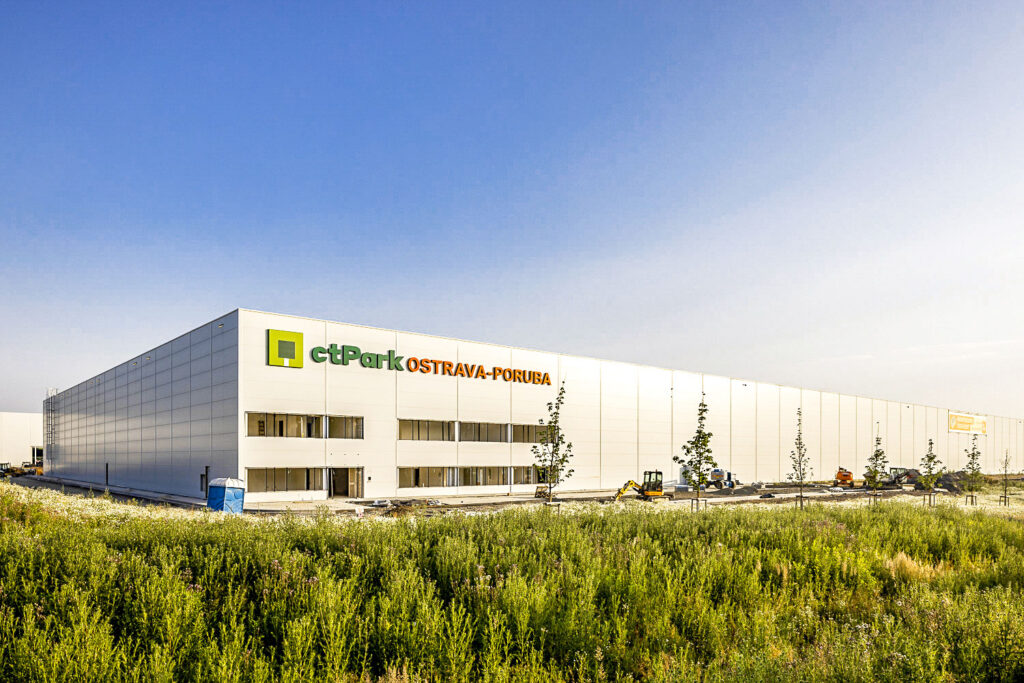Raft of Warehouse Deals in Czechia Signed
31st May 2023

CTP has signed deals totalling 96,000 sqm at five of its logistics CTParks across the Czech Republic since the start of 2023. A range of factors including rising domestic consumption, strong economic growth and the trend for ‘nearshoring’ have led to multinationals continuing to expand their footprint in the country and the wider Central and Eastern European (CEE) region.
Since January, Dr.Max the rapidly expanding Czech headquartered pharmacy business, has taken 27,000 sqm on leases at two CTParks in the Czech Republic. It has signed for 15,800 sqm on a 20 year lease at CTPark Brno Lisen in the south of the country, where Dr Max will also open a pharmacy for the community of businesses at the park. Dr.Max has also leased 11,300 sqm at CTPark Ostrava Poruba for 5 years in the east of the Czech Republic. Dr.Max operates across the CEE region and Italy, with 17,000 employees and 2,500 pharmacies in countries including Poland, Slovakia, Hungry, Bulgaria and Romania as well as the Czech Republic.
Dr.Max is just one example of a multitude of CEE businesses that have benefitted from the fast growth of the region’s economies and middle classes in recent years. CTP published research last month, called ‘CEE: A Business-Smart Region’, that showed the region has shown strong resilience with real GDP growth outperforming Western European markets and the whole of Europe. This trend is set to continue as CEE GDP growth is forecast to grow twice as fast as the Eurozone average between 2023 and 2026. Fuelled by economic expansion, domestic consumption in the CEE has grown by almost 50% since 2010, more than double the rate of the EU-27 average.
The Czech Republic and the wider CEE are also benefiting from the ‘nearshoring’ trend among international businesses. In the first part of this year, a German provider of third-party logistics solutions (3PLs) has signed for 19,000 sqm of space at CTPark Žatec in the north west of the Czech Republic just 30km from the German border. While an Asian manufacturer of IT components has taken 50,000 sqm of space at CTPark Blucina in the south of the country, close to the Austrian border.
Nearshoring has been driven by the pandemic and a changing geopolitical environment increasing supply chain risk and in turn demand for manufacturing closer to home, where products consumed in Europe are increasingly made in Europe. In a recent survey MAERSK identified the Czech Republic as a global top 10 hotspot with Poland ranked in first place and Romania in second.
Jan Žák, CEO of Dr.Max for the Czech Republic said: “The CEE’s strong economic backdrop has supported the expansion of our business and we believe it will continue to do so for many years to come. We value our relationship with CTP because it builds energy efficient logistics properties to suit our needs then continues to own and manage them for the long term. This creates a lasting landlord-tenant relationship because it means CTP has an in-depth understanding of our requirements, which is invaluable as we increase our footprint across the region. We are already tenants at three CTParks in Romania, where we occupy almost 50,000 sqm of space.”
Jakub Kodr of CTP said: “The CEE continues to demonstrate its resilience and dynamism, with the region’s industrial and logistics sector expected to outperform Western and Southern Europe. The fact we have let 100,500 sqm of space in the Czech Republic alone since the start of this year, is further evidence of the economic strength of the region. In Q1-2023 we signed leases totalling 297,000 sqm and two-thirds of these were with existing tenants. This is central to our business model of growing with existing tenants like Dr.Max, providing them with a flexible service tailored to their business, so when they need to expand they do so within our portfolio.”
CTP also attributes its success to being what it calls ‘Parkmakers’ – not just building logistics buildings — but creating vibrant sustainable business ecosystems for people – its clients, their employees, and local communities. Developing industrial space alongside cafes, gyms, convenience stores and more, all close to urban centres, with energy efficient buildings and forest conservation.

